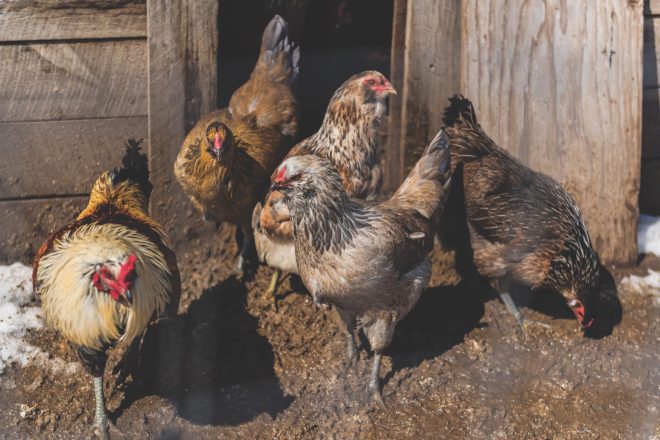Pandemic May Turn People Back to Local Farms
- Share
- Tweet
- Pin
- Share

by Polly Fitz
At Waseda Farms in Baileys Harbor, store manager Sayard Geeve said, “The phone is ringing off the hook.” Flying Tractor Farm in Sturgeon Bay has been selling more of its meat products. Cold Climate Farms in Nasewaupee is getting calls from people asking whether its staff can ship food.
As the COVID-19 outbreak spreads throughout the country and here on the peninsula, local farms are affected differently from many other operations. Farmers with products available now are coming up with new ways to safely get their food to customers, and as they prepare now for the outdoor growing season, they’re dealing with uncertainty about what their customer base will be this summer.
Farms that produce year-round have seen an important, regular revenue source dwindle or disappear.
“The restaurants have definitely stopped ordering or, if not stopped, really slowed down because of the pandemic,” said Sarah Evenson, manager of Flying Tractor Farm, which produces microgreens, salad greens, eggs and meat year-round, along with organically grown produce in season.

Evenson said some restaurant chefs are making personal orders for their families, but without the bulk egg orders they typically get from restaurants, they have extra eggs.
“The ladies are producing,” she said laughingly of the hens. “We’re still looking for homes for the eggs.”
Evenson said the coronavirus outbreak has increased consumers’ awareness of the farm’s meat, and also perhaps their appreciation for the care with which Flying Tractor raises its animals.
For now, Flying Tractor is taking phone orders for its products and has a no-contact farm pickup system in place. It plans to open an on-site farm stand May 1.
Waseda Farms is known for its grass-fed meats, and it is unusual in that it not only raises its animals, but does all of the finishing work, too.
“We cut every steak; we grind all the ground beef,” said Matthew Lutsey, president and owner.
Waseda’s attention to detail, and the fact that it’s a small operation, may be especially important right now. On April 12, Smithfield Foods announced that its South Dakota pork-processing facility was closing indefinitely after more than 300 employees had tested positive for COVID-19. The plant produces nearly 5 percent of the pork produced in the U.S. Two days earlier, JBS USA, which employs thousands of people at its Colorado meat-packing facility, said it was closing temporarily to deep-clean the plant and test all of its employees for the disease.
Lutsey said that although he and his team are “consciously concerned” about the coronavirus and are paying even more attention to safety and cleaning, Waseda’s history in running a clean operation means its staff hasn’t had to change much.
“Our inspectors love to use us as a model for how a small-scale operation can be run clean, neat and tidy, and we’re proud of that,” he said.
Waseda also operates a small, on-site market with dairy, produce and grocery items. After seeing an increase in in-person shopping in early March, Geeve closed the store March 16 and pivoted to curbside pickup, taking orders by email and phone.
“(Business) is up 30 to 50 percent,” she said, estimating that about a quarter of that is from new customers.
Geeve said staff members have just started seeding the two-acre garden, so they’ll have their own organically grown vegetables for sale this summer.
At Cold Climate Farms, which produces organically grown vegetables, COVID-19 has hit at a relatively quiet time. Co-owner Benjamin Blohoweak said the sales period there typically starts in late May, and the disease outbreak hasn’t changed much of the planting.
“We’re not drastically shifting gears, but it’s just kind of nudging us to make some changes that we were already thinking about,” he said.
Cold Climate gets about 25 percent of its sales from restaurants, and Blohoweak said those orders are a “big question mark” right now.
The majority of Cold Climate’s revenue comes from farmers’ markets, which are considered “essential businesses” under Governor Evers’ Safer at Home order. He plans to sell at the markets in Jacksonport and at Door County Brewing, as well as at the downtown Green Bay farmers’ market.
Blohoweak and his partner have also decided to offer a new CSA (community-supported agriculture) subscription that will have pickup locations in DePere, Sturgeon Bay and Suamico, plus home deliveries to Northern Door.
At Emerald Acres Farm just south of Sturgeon Bay, CSA has been the standard sales model for its organically grown vegetables, but owners Valerie and David Boyarski say COVID-19 has made them consider different processes for getting their produce to shareholders. They’ve been getting lots of calls in recent weeks from customers expressing a desire for prepackaged produce so they can better practice social distancing.
“We’re basing [our plan] on not knowing what’s coming over the next couple of months, and people are wanting to secure their options now,” Valerie said.
For CSA customers Emerald Acres will stagger pickup times and offer a drive-through system to maintain social distancing.
The Boyarskis note that during past years, CSA pickups at their farm have always been a time for social gathering. Evenson said that typically anyone who arrives at Flying Tractor to buy food gets an in-depth farm tour. COVID-19 is definitely taking away the person-to-person education and relationship-building that they and many other farmers enjoy, but local food producers see a silver lining.
“We’ve seen a lot of positive from this,” Evenson said. “It’s the consumer being aware of local farms and wanting to know where their food comes from.”

